Ozuna: ‘I don’t see myself singing reggaeton in 10 years’ time. I’d like to work in business’
The Puerto Rican musician is one of the biggest in the world. But for how long? It’s up to him
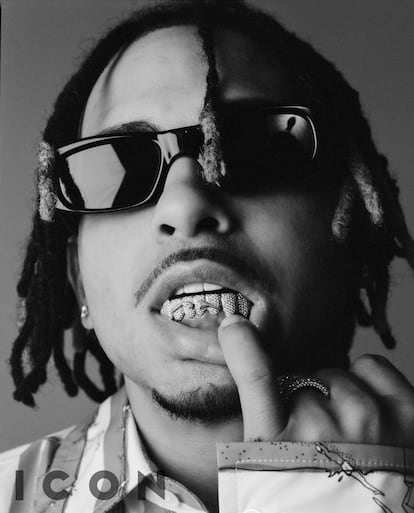
Sometimes it’s surprising that a person doesn’t behave like a star, when they could very well do so. As an example, let’s take Juan Carlos Ozuna Rosado, the man with the $100 million Sony contract, the artist with 13 videos on YouTube with more than one billion views, the producer that Shakira turned to for Monotonía (2022), and one of the singers on the ubiquitous Te boté (2017). On the night of November 1, he got out of his sports car on the runway at Miami airport and got on a private jet heading to Madrid. About 17 hours later, at four in the afternoon in Spain and after posing for three hours, the man with 23.5 million followers on Instagram stood in the photography studio, eating a hamburger with the EL PAÍS team and the 11 people in his entourage.
A few minutes later, the 12 of them, plus the members of their Spanish team, left in two black vans on their way to the Wizink Center to rehearse for the LOS40 Music Awards gala. On November 3, they performed at the ceremony. He sang Caramelo and Eva Longoria, a song from the EP Afro, which he released this past summer, and which in Spain — only Spain — was a surprise hit that wasn’t even promoted and didn’t have a video. He was nominated in five categories, and won two: Best Latin Urban Collaboration for Hey More, with Feid; and a Golden Award, an award created for those established artists who already have everything. On the 4th of November he traveled to Paris to shoot the video for a song from his new album, Cosmo. The release of his sixth album was scheduled for January, but the album was leaked and in the end it was brought forward to November 17. Ozuna presented it in a club in Madrid for an audience made up of fans, influencers, and celebrities, after performing at the Latin Grammy Awards in Seville.
Critics have agreed to define Cosmo as Ozuna “going back to his roots.” It’s a reggaeton album with the honeyed voice that makes the singer so recognizable. Baccarat, which seems to be his favorite song, is exactly what millennials call “old reggaeton.” The exception is Vocation, which is a collaboration with David Guetta, the well-known French DJ. “It is intended as the first single. Working with someone as ‘Anglo’ and as global as him has been one of my best experiences. I know it has given me a lot,” Ozuna says when he finally sits down for the interview.
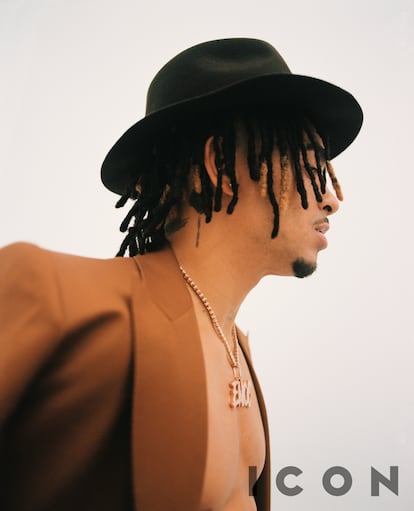
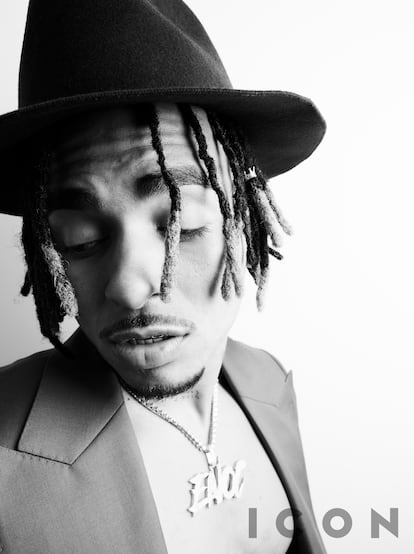
It has been difficult to get him to sit down, because delays and unforeseen events have added to his already busy schedule. Let’s get this talk started: the initial plan was to do it at noon, but when we finally find the time, it’s a quarter past eight in the evening. It’s been almost 24 hours since he got on the jet in Miami, but he doesn’t look tired. Have you slept today? “I’ve slept. I slept on the plane.” Do you enjoy traveling at this pace? “Yes, I enjoy it, I try to enjoy it more and more, because if not, you’re going to feel angry and you’re going to get frustrated because you are not at home. I like being with my fans, asking me for a photo, and stuff. Many people get upset with those things, but not me. You have to say: ‘I am where I need to be, I really love what I do, and I enjoy it.’”
Ozuna smiles. He presents a slight figure in his sports clothes and a cap under which his dreadlocks peek out. He is covered in diamonds: on his earlobes, his neck, and his wrists. He speaks Spanish with a Puerto Rican accent, although not as pronounced as when he speaks with the other Puerto Ricans in his entourage. They have all come for the interview and sit with us in silence, listening to every word. There are two people who follow him everywhere and record everything. There are also two huge bodyguards who don’t speak Spanish and who guard the doors, because as soon as word spreads that Ozuna is in town, his fans come out of the woodwork. His manager is also here, and so is one of Ozuna’s friends who has accompanied him on this trip, and several other people.
Ozuna is the son of a Puerto Rican mother and a Dominican father. His father was a dancer for Vico C, a pioneer of rap in Spanish, and was shot dead when Ozuna was three years old. “My dad danced with Vico for about four or five years, if I’m not mistaken. My grandmother told me his stories. Vico, as you know, says that I look a lot like him and that he sees my dad in me, like this music and entertainment thing comes in the blood. We don’t go looking for it. It’s there.” Were there other musicians in the family? “Just my dad, really. My uncle was something, but nothing fixed. But it’s like we liked all [types of] music. I listened to reggaeton 100%. All those songs that were already old — Baby Rasta & Gringo or Maicol and Manuel. Vico was one of the pioneers. He opened the door for us to pass through.”
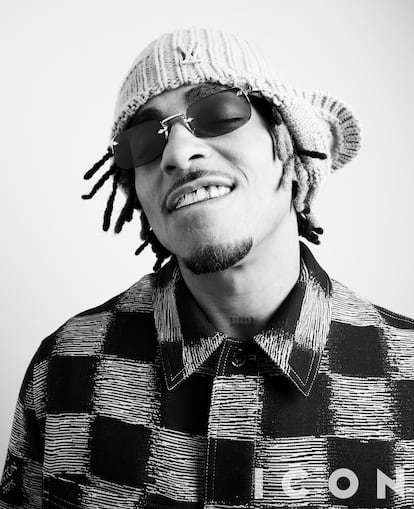
Are you aware of the fact that, right now, you are one of the ten biggest artists in the world? “That’s what they tell me all the time.” Do you find it difficult to keep your feet on the ground? “I mean, sometimes you get carried away, don’t think you don’t. If I tell you I don’t, I’m lying to you, because you know I do. But really, keeping your inner circle keeps you grounded. Having people like your family, your children, or your wife around you. I’m not going to tell you that we are saints. We all know that we are people who might not control particular things, but being true to yourself is the hardest battle. The rest is to live and continue working, continue fighting for tomorrow, because in this life, even if you have 100 million [dollars], you have to do the same as if you had only one.”
Ozuna is married and the father of two children. “My daughter plays the flute and the piano, she loves to sing, she is not afraid of the stage. The boy is more into sports, but the girl already has that musician’s hunger,” he says. Someone once said that he didn’t let his children listen to his music because of the lyrics. “No, the other way around. I feel like they are my producers. I play five songs and wait five minutes. And the song that sticks with them, you know that song has it. They are my gauges.”
There is a new wave of Latin artists who have decided to break gender patterns and the misogynistic stereotypes associated with them. But Ozuna, who was one of the first to talk about this change, is aware of the generation to which he belongs. “I believe that each of us has our fans, and a lot of the time we focus on those of another artist. And we neglect our own. It’s a mistake, because our fans are our fans. My fans liked Farsante, Vaina loca, Una locura, all those songs. I can’t change them. I would like to change them, but my fans wouldn’t allow me, because there are millions of them. We are at a time when the fans want to understand the reality of your lyrics. Before, I would s: ‘Come to bed.’ Now the fans want to know what I’m asking her to come to bed for.”

Puerto Rico is the new mecca of commercial pop, what some of the Anglophone media call “popetón.” The island has given us not only Ozuna, but also Bad Bunny, Anuel AA, and Rauw Alejandro: an entire generation of stars of the streaming era. It is nothing new that the sound that has conquered the world has come from an unexpected place. Nobody would have bet that Elvis Presley, the man who revolutionized youth music in the 20th century, was going to leave a hamlet called Tupelo in Mississippi, or that years later in Liverpool, a gray industrial city in England, four kids called The Beatles would take the world by storm. Nor did anyone know where Seattle was before Nirvana. It is true that the currency of Puerto Rico is the dollar, which helps, but it is also true that they have changed the face of commercial pop with a rhythm that has been despised for years: reggaeton. Likewise, singing in Spanish is a double merit. If one has access to the list of the hundred best-selling songs in Spain, the change compared to those of a few years ago is incredible. More than 95% are songs in Spanish. The hegemony of reggaeton and urban music is indisputable. And within it, the nation with the most artists is Puerto Rico.
Why there? “I believe that 100% it is the hunger of wanting to push forward. First of all, the hunger that Puerto Ricans have to want to improve themselves. Also, the bond that exists when collaborating on a project. In other places there is always a fight if people want to make music. But Puerto Ricans, if they want to make a hit, they cooperate. If they want to make a building, they cooperate. It is a very small island where many things are practiced: sport, music, medicine... I feel that the island is blessed. In Puerto Rico, the majority of us believe in God, and I believe that is the island’s blessing. A [Puerto Rican] baseball player or an artist always stood out. There is something that stands out that is inexplicable, and I say that it is God’s blessing.”
Why right now? One thing is what happened in 2004 with Daddy Yankee’s Gasolina, a global but one-time hit. And another is this moment, in which an entire generation has triumphed. “The genre was born in Puerto Rico and has had a complete evolution. I thank those pioneers who kept on working, and today we can enjoy that. We do it with the same passion. We haven’t let it fade. We’re opening doors so others will come, and I believe that is what keeps the movement alive. Puerto Rico is only just getting started. There is still more to come. This is one generation, but there is a lot of talent and more will come.”
What is undeniable is that Puerto Rican reggaeton has conquered much of the world. Not just Europe and the United States anymore. It is almost impossible not to hear Ozuna anytime, anyplace. Is there anywhere that remains untouched? “We still have to conquer part of Asia. I think we have to go do concerts, performances, television, and stuff. I think we have to start a movement and work with artists there. We have worked on the structures, we have invested time and money. Let’s put an ad in Japan, for example. How much does it cost? Okay, $200,000. There are artists like me who say, ‘Yes. Let’s put it on because I want the Japanese to see me.’ I went to Japan to make a video for $100,000, when no one made videos. It is taking a risk on those types of things so that this continues to grow. By making that video in Japan, I did my part and that’s where the genre began to grow. I don’t know if that’s the case, but I feel like I contributed to it, and many other artists have to do it too.”
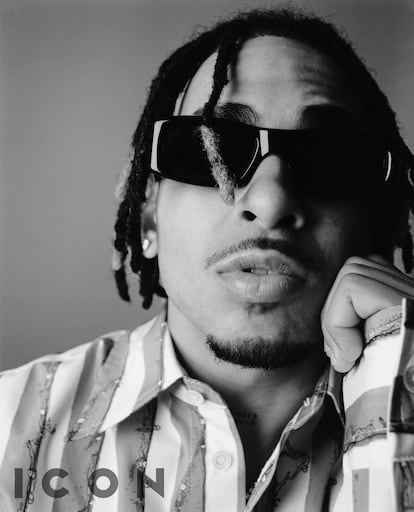
The big problem is actually practical. A concert promoter recently said that one of the reasons why the cachet of top artists has increased so much is because demand has skyrocketed. Five years ago, a 40-date tour was enough to reach the places in the world that demanded it. With the entry of new markets, such as Asia, and the interest of the North American public in music in Spanish, there are now 80 countries that can pay for it. And the artists have to choose. “It’s true and it’s tiring, because at the moment one year isn’t enough. It’s not enough, no. In all of Latin America there are 25 dates. Let’s say, for example, that in the United States you have 30 or 35. With that, your year is gone. It’s brutal. You don’t have time to go anywhere else,” he acknowledges. By the way, this summer there will be a Cosmo tour, but the singer is not saying anything. “It starts in May and we are going to do Europe. I was going to tell you about it, but I held off because we’ll announce it in January,” he jokes. By the way, do you often talk to your old friend Bad Bunny? “I talk to him and a lot of the time we don’t stop and think about what we are experiencing. It feels like we are still in 2015. And then people like you remind us how far we have come.”
Taking into account the pace you are moving at, where do you see yourself in 10 years? “Really what I would love is to be a businessman. Do business globally or real estate in Puerto Rico or the Dominican Republic. I don’t see myself singing reggaeton or singing [in general] in 10 years.” Will you really quit music? “Not quit music, but I see myself producing more. I see myself doing other projects. I like sports, I have my team in Puerto Rico [Los Osos de Manatí, a basketball club that he bought in 2022], which I love. I feel like I am learning a lot there. In 10 years I see myself in the team’s management, working with them.”
Is it true that if you had not gotten into music, you would have liked to play basketball? “Yes, I would be with fighting with Curry.” Did you have skill? “I had a little bit.” And how is your team doing? “It’s not going well. I’m not going to lie to you. Last year they were last. But we have to keep fighting. We can’t lose hope. We have to fight hard and this year we are going to win.”
The interview ends. Ozuna gets up and the entourage gets up without needing to be told. Because it’s one thing to not look like the boss and another not to be the boss.
Sign up for our weekly newsletter to get more English-language news coverage from EL PAÍS USA Edition
Tu suscripción se está usando en otro dispositivo
¿Quieres añadir otro usuario a tu suscripción?
Si continúas leyendo en este dispositivo, no se podrá leer en el otro.
FlechaTu suscripción se está usando en otro dispositivo y solo puedes acceder a EL PAÍS desde un dispositivo a la vez.
Si quieres compartir tu cuenta, cambia tu suscripción a la modalidad Premium, así podrás añadir otro usuario. Cada uno accederá con su propia cuenta de email, lo que os permitirá personalizar vuestra experiencia en EL PAÍS.
¿Tienes una suscripción de empresa? Accede aquí para contratar más cuentas.
En el caso de no saber quién está usando tu cuenta, te recomendamos cambiar tu contraseña aquí.
Si decides continuar compartiendo tu cuenta, este mensaje se mostrará en tu dispositivo y en el de la otra persona que está usando tu cuenta de forma indefinida, afectando a tu experiencia de lectura. Puedes consultar aquí los términos y condiciones de la suscripción digital.








































